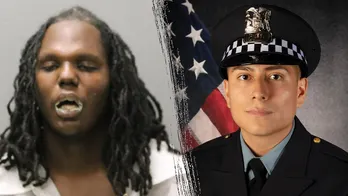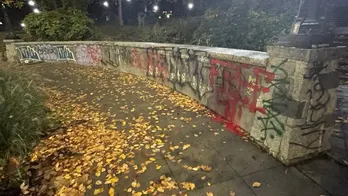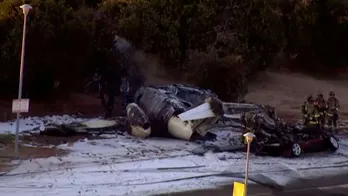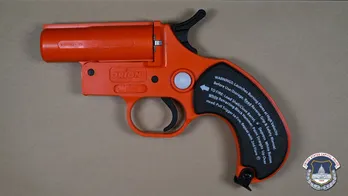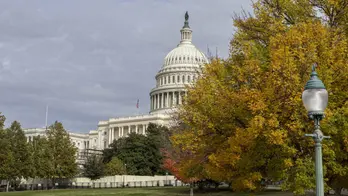Chance encounter: A young migrant takes a seat next to an NPR reporter
About a month ago, I was on a plane to New York City. I was coming back from reporting in California, for NPR, out on the border. I sat next to a young man from Ecuador. He had big black eyes and braces, and despite being 22, an adolescent sheepishness. Ramón. I won't use his full name because he's worried about repercussions for his family from the people who financed his trip.
"Excuse me," he said in Spanish, tapping me hesitantly. "I haven't really flown a lot. Would you mind recording a video out the window?"
I myself am very scared of flying, by the way. In fact, he had caught me just as I searched for the prescription medication I take to calm my nerves on a plane. My arm was still deep in my bag, searching for the pills, as I answered.
"Sure. No problem."
I decided I would knock myself out later. I put my phone up against the window, and started recording.
"Do you fly a lot?" He asked. I noticed his voice had a boyish crackle to it.
"Yeah", I told him. "I don't love it."
Ramón told me, this was actually his second time flying. The first had been just a few weeks ago. A short trip from Ecuador to El Salvador. He told me he'd crossed the border into the US two days ago. Border Patrol had apprehended him, processed him, and let him go with a notice to appear in immigration court in a few months. I wondered where he was going to stay once we landed. He told me he was going to go be with his cousins in the city.
"It's cold in New York." I warned him. "Very, very cold. Do you have a jacket?"
He said he did and pointed to the hoodie he was wearing.
I looked out the window at the San Diego palm trees and thought about how bitingly cold New York City is in December.
I turned back to him. He looked terrified.
"If you want", I offered, "I can hold your hand." He smiled and grabbed my hand as the plane started speeding down the runway.
Thousands of feet down below, I could see the desert. I'd been there just a few days ago, reporting for NPR.
Ramón leaned in over my shoulder and looked out.
He told me that looked like the desert he crossed, at the end of a 21-day journey. Mostly on foot. From Ecuador to the US border. He said it like even he couldn't believe it.
As an immigration correspondent for NPR, I've heard so many stories like this in the last year, from people on the border, who've traveled for days and months, mostly by foot, to come to the US. In their mouths, places like Daly City, California, or Manassas, Virginia sound like Xanadu or El Dorado.
A lot of them will get an immigration court date. It's a common process called "parole," and it is very controversial. Ramón's court date is in March. There are a few different possible outcomes, and I don't know what his will be. But even as we sped towards New York, in his pocket was a document getting the ball rolling on his deportation.
Back in Ecuador, Ramón tells me, drug cartels have spread through the country like wildfire. It's gotten terrifying. So he says he sold everything he owned to pay for coyotes. Those are the people who will get you to the US border and across it.
He paid them 3 thousand dollars. He still owes them 2 thousand.
He showed me a picture of three cousins, saying goodbye to him. They were smiling. He said his mom and grandma couldn't bear to pose for the picture, they felt too broken by his leaving. I could tell he didn't want to cry in front of me, and he was about to. So I pointed out the window. We were going over the Rockies.
"That white stuff is snow?" He asked me.
"It is. You know, the first time I experienced snow," I told him, "it felt like walking on sugar."
This cheered him up, and he started talking about how he was going to get a job as soon as he got to New York. Pay off his debt. As he talked, I thought about New York and the over 150 thousand people who have arrived in less than two years. New York officials say there's no more room, no more money, and migrants need to stop coming. Almost every single day, I get a wave of desperate text messages, from recently arrived people I've interviewed, telling me they are scared, they can't find housing, they are barely surviving.
I changed the subject and pointed out the window at the Great Plains. "Nebraska, Kansas, Iowa", I listed, "it's pretty flat."
A few hours later, the flight attendant announced that we were approaching New York.
I explained that we were about to start descending. So he should buckle his seatbelt and press the button on his armrest, to straighten his seat.
"Wait", he said. "I could have been reclining this whole time?!"
The plane whined mechanically. Ramon grabbed the front of the seat and gasped. I remembered every reassurance I'd ever been given by people watching me panic on a plane. "Ramón," I said, "Imaginate que sos un pajaro." Ramon, Imagine that you are a bird. And that machine noise is the sound of you extending your wings to land. Suddenly, the city appeared, like an open mouth filled with a million sparkling teeth, taking us in.
"That's New York", I told him. "And that's called Queens. It's really the best borough."
"Queens?"
"Queens."
"I am already in love with it", he responded. "I want to get out and see it all. I've seen it in the movies."
As we taxied to our gate, we sat silently. What to do you say to someone who has just landed in New York, several thousand dollars in debt to a cartel, with an immigration court summons in his pocket?
So I just turned to him and said,
"You made it."
Disclaimer: The copyright of this article belongs to the original author. Reposting this article is solely for the purpose of information dissemination and does not constitute any investment advice. If there is any infringement, please contact us immediately. We will make corrections or deletions as necessary. Thank you.

